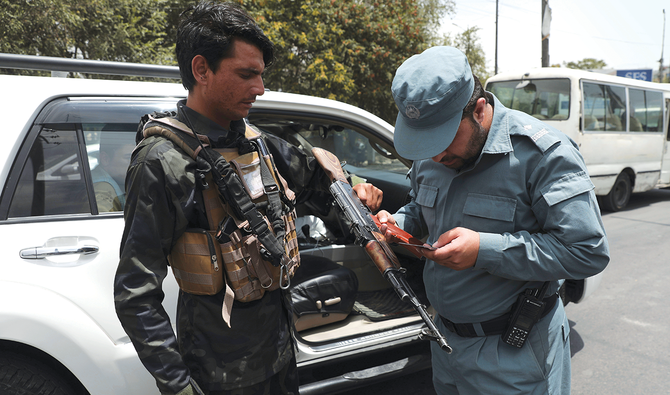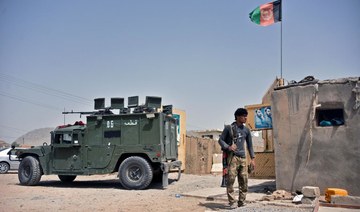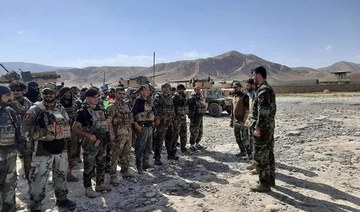KABUL: The Taliban on Tuesday said they would target all foreign soldiers remaining in Afghanistan beyond a Sept. 11 deadline for the withdrawal of troops.
The group’s warning followed reports that the UK and the US were planning to retain troops to protect diplomatic missions and Kabul’s international airport.
Zabihullah Mujahid, a spokesman for the Taliban, told Arab News: “The outcome of this will be very bad. The Islamic Emirate representing the nation and people of Afghanistan will not allow America or any other foreign country to keep their troops. We will deal with them as occupiers.”
Media reports on Monday suggested that a “small group of special forces of the British Armed Forces may stay in Afghanistan after the withdrawal of the main part of the troops.”
But referring in part to a landmark deal signed with Washington in Doha, Qatar more than a year ago, Mujahid said: “They should know that we are serious in our words, and we do not want to have bad relations with these countries, but they should not use pretexts by violating the commitment.”
As per the agreement, all US-led foreign troops had to withdraw from the war-torn country by May 1, nearly 20 years after an invasion.
The Taliban reiterated their pledge on Tuesday, warning that if troops did not leave, “they will face the same experience that they had in the past 20 years.”
The controversial Doha deal, inked under former US President Donald Trump’s watch, also paved the way for the intra-Afghan peace talks between President Ashraf Ghani’s government and the Taliban.
However, after assuming office in January, American President Joe Biden said that all US combat troops would leave Afghanistan by Sept. 11 instead of May 1, ending the US’ “forever war.”
The removal of all foreign troops coincides with the 20th anniversary of the Sept. 11, 2001 terror attacks, which resulted in the Taliban’s ouster in a US-led invasion the same year. Biden’s decision angered the Taliban at the time, who warned of consequences but did not attack any foreign forces in keeping with their part of the pledge in the Qatar accord.
The UK played a significant role in combat operations in Afghanistan between 2001 and 2014, leading the fight against the Taliban in the southern Helmand province.
At its peak, there were around 130,000 NATO troops deployed in Afghanistan, with British forces reportedly at about 9,500.
More than 2,300 US personnel have been killed and 20,000 injured in Afghanistan since 2001, while tens of thousands of Afghan security forces and more than 50,000 civilians have also died.
Although the UN has repeatedly linked civilian casualties to militant attacks, in recent years it has reported a spike in civilian deaths due to air raids and operations by government and foreign troops.
In its annual Afghanistan Protection of Civilians in Armed Conflict report released in February, the UN’s human rights agency and its assistance mission in the country (UNAMA) said there was a “disturbing spike” in civilian deaths, with 3,035 fatalities and 5,785 injuries registered last year.
Recently, the UK, which opposed the exit of all foreign troops in the absence of a peace deal between Kabul and the Taliban, said it wanted a prolonged military presence to train Afghan forces, while Washington said it would retain troops to guard and protect the Hamid Karzai International Airport in Kabul.
“They should act on their promise and go; this would be good for them,” Mujahid added on Tuesday.
The halt of vital air support for Afghan forces by US-led troops has partly helped the Taliban gain ground, particularly in northeastern areas of Afghanistan, where the militants failed to establish a stronghold when in power.
Taking advantage of the vacuum created by the foreign troops’ departure since May, the Taliban have overrun dozens of districts, capturing 150 military outposts in the last two months and reigniting concerns that the militants would regain power by force similar to the 1990s.
Hundreds of government forces have surrendered to the Taliban in recent weeks, mainly in the northern and northeastern regions, with thousands fleeing to neighboring Tajikistan.
On Monday, more than 1,000 Afghan troops reportedly escaped to Tajikistan after clashing with Taliban militants to “save their own lives,” a statement by Tajikistan’s border guard said.
Afghan government officials declined to comment on the issue.
However, to block the Taliban’s advances, Ghani’s government began arming and funding local uprising forces two weeks ago.
Mariam Koofi, a former lawmaker for the northeastern Takhar province, told Arab News: “People are surprised about the military developments and loss of districts one after another to the Taliban.
“They worry that there is possibly a deal to allow the Taliban to gain ground, and it shows that US endeavors for building a strong army with so much expenditure did not yield anything good at the end.”
Some experts have claimed that “chronic corruption” in the Afghan government had been a key factor in troops surrendering to the Taliban.
Torek Farhadi, an ex-adviser to former President Hamid Karzai, told Arab News: “Ghani abandoned the frontline soldiers, years before the frontline soldiers abandoned him, by surrendering to the Taliban, complete with their weapons.
“The Taliban arrived and gave cash to hungry soldiers, $120 each. Surrendering soldiers were set free … this makes good public relations for the Taliban as well,” he said.
The recent escalation in violence and precarious security status has prompted Russia, Turkey, Iran, and Pakistan to shut down their consulates in the northern Mazar-i-Sharif area during the weekend, official sources told Arab News.
Meanwhile, Tajikistan on Monday ordered the deployment of 20,000 troops near the Afghan border to deter a possible spillover of violence amid the Taliban’s advances, which also includes the capture of a port town near its frontier.
The escalation of fighting comes amid harvest season and has forced hundreds of families to flee their homes in various regions.




























